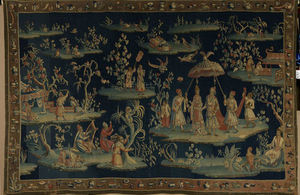Export bar to save rare 1600’s London tapestry
Culture Minister steps in to prevent an Indian Manner tapestry from export

English Tapestry
Culture Minister Matt Hancock has placed a temporary export bar on a rare tapestry by Michael Mazarind to provide an opportunity to keep it in the country.
Export bar placed on rare tapestry
The tapestry is at risk of being exported from the UK unless a buyer can be found to match the asking price of £67,500.
Inspired by Indian, Chinese and Japanese design, it is the only surviving tapestry to feature Mazarind’s workshop mark. Little is known of his workshop, but it is believed he was based in Portugal Street, London, between 1696 and 1702. Michael Mazarind was relatively unknown, but is said to have connections to John Vanderbank, the Soho-based weaver.
The tapestry includes small groups of oriental figures, buildings, exotic creatures and plants. This combination of elements was described as ‘in the Indian manner’, and was one of the most popular decorative fashions of the period.
Minister of State for Digital and Culture Matt Hancock said:
This intricate design provides us with a unique opportunity to explore the tapestry workshops of 1600s London. I hope we are able to keep it in the country so we can learn more about our nation’s textile industry, and of the decorative fashions of the time.
The decision to defer the export licence follows a recommendation by the Reviewing Committee on the Export of Works of Art and Objects of Cultural Interest (RCEWA), administered by The Arts Council.
The RCEWA made its recommendation on the grounds of significance for the study of Mazarind’s work, English tapestry of the period, and London’s history.
RCEWA member Christopher Rowell said:
This beautiful blue ground tapestry, with an equally unusual border of Chinese inspiration, dates from the late 1600s and is the only one to bear the woven signature of the mysterious Michael Mazarind, who was a rival of the more well-known London tapestry weaver, John Vanderbank. This type of ‘Indian’ tapestry depicting a Chinoiserie fantasy paradise in Cathay, with courtly and hunting scenes, was devised for the court, but soon became more broadly popular. Saving the tapestry for the nation will allow specialists to study it in detail and help to reconstruct Mazarind’s contribution to tapestry production in early-Georgian London.
The decision on the export licence application for the tapestry will be deferred until 19 January 2017. This may be extended until 19 April 2017 if a serious intention to raise funds to purchase it is made at the recommended price of £67,500.
Offers from public bodies for less than the recommended price through the private treaty sale arrangements, where appropriate, may also be considered by Matt Hancock. Such purchases frequently offer substantial financial benefit to a public institution wishing to acquire the item.
Organisations or individuals interested in purchasing the tapestry should contact the RCEWA on 0845 300 6200.
Images of the tapestry can be downloaded here